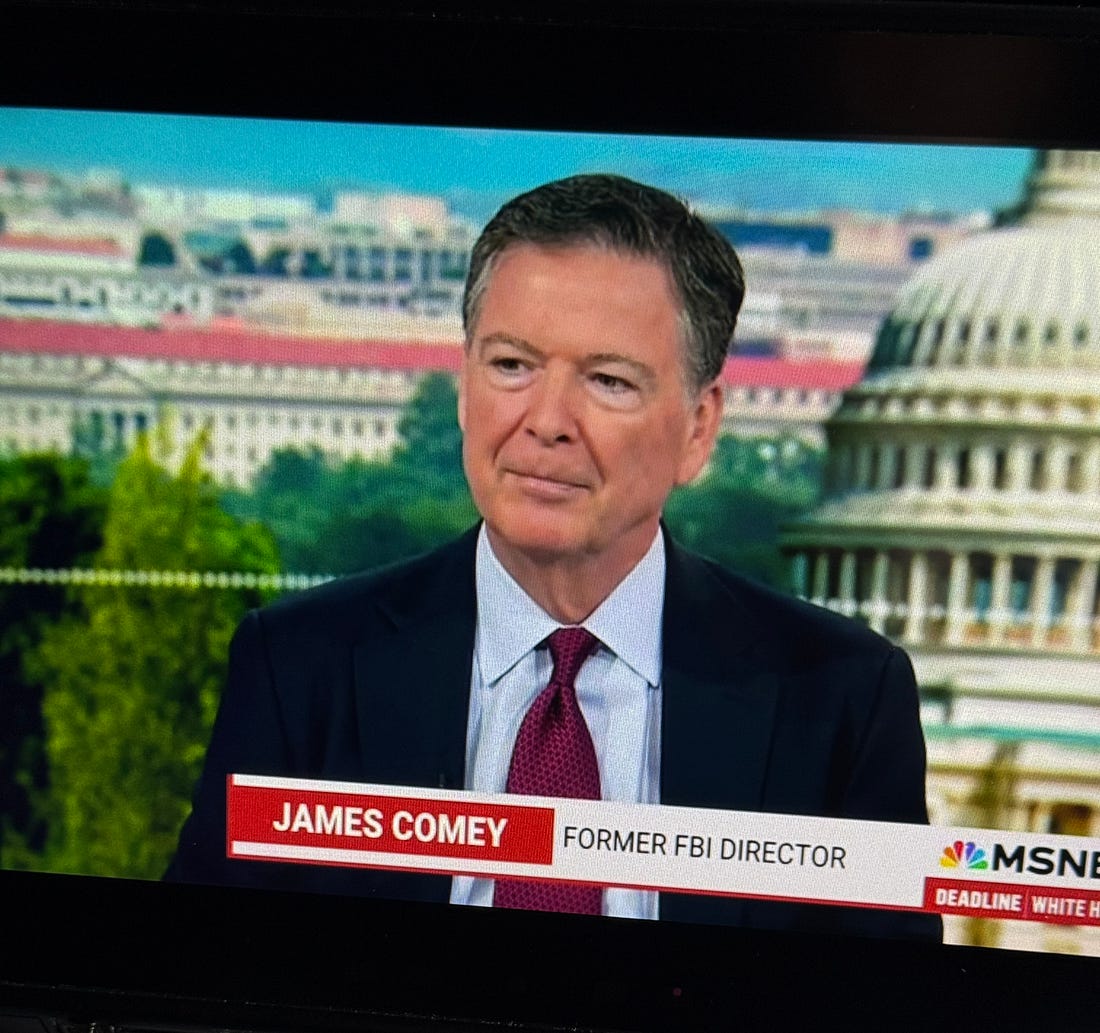|
 |
This morning at 10 a.m., former FBI Director Jim Comey was arraigned in federal court. As expected, he pled guilty. District Judge Michael Nachmanoff set a trial for January 5. Comey’s defense lawyer, former Chicago U.S. Attorney Pat Fitzgerald, told the court it was the honor of his life to represent Comey. Fitzgerald, who is not prone to unnecessary commentary, clearly understands the importance of the moment and the case.
Interestingly, the government doesn’t want a speedy trial. We’re “just getting our hands around” discovery, prosecutors tried to explain to the judge, telling him that the case is complicated. It isn’t. A false statements case is about as basic as they come. Prosecutors must prove the statement was made by the defendant, that it was false and the defendant knew it was false, and that it was material or important to the outcome of the government proceeding in which it was made. “This does not appear to me to be an overly complicated case,” Judge Nachmanoff told the prosecution team.
The prosecutors who are taking over the case from Trump’s never-before-prosecuted-a-case U.S. Attorney Lindsey Halligan in the Eastern District of Virginia were dropped in from the Eastern District of North Carolina, and it’s not clear they understood they had landed in the Eastern District of Virginia’s notorious “rocket docket.” As we’ve discussed, the Eastern District of Virginia fast-tracks its cases, but the new prosecution team wanted to put off turning over discovery, one of the first steps that gets a criminal prosecution underway, until mid-January. The Judge set the trial date before that. Welcome to Alexandria, Virginia.
Fitzgerald pointed out that prosecutors still hadn’t told him what false statement(s) his client was accused of making. When the prosecutors said they were trying to decide how to handle classified information, Fitzgerald commented that prosecutors usually have that sorted out before they indict. In any event, while Trump stripped Comey of his security clearance and Fitzgerald’s has lapsed, another lawyer on the defense team possesses one and can get to work. The Judge indicated that classified material shouldn’t delay the proceedings.
Everything is building towards the two motions the defense said it expected to file, one to dismiss the cases because Halligan, the only prosecutor to sign the indictment, wasn’t properly appointed to office, so the indictment is fatally flawed (and can’t be fixed because the statute of limitations has run). This motion, which will hinge on the arcana of federal vacancy appointment law, might ironically be based on a memo Justice Alito wrote when he was in DOJ’s Office of Legal Counsel.
A second motion will charge some species of selective and/or vindictive prosecution. That latter motion in particular keeps looking better and better. Tonight, The Wall Street Journal is reporting that when Trump posted the infamous “Truth” to Pam Bondi, directing her to indict Comey, he thought he was DMing her. Trump was “surprised to learn it was public,” according to the Journal. (We’ll leave for another time the implications of the president pressing the wrong button on such a serious matter, to say nothing of running private comms with cabinet secretaries on social media). The defense has a strong argument that the president’s personal dislike of Comey led to the prosecution, especially after longtime prosecutors rejected it because they didn’t have evidence.
There was also reporting today from ABC about Columbia Law Professor Daniel Richman. Many people believe he is the unnamed individual the indictment says leaked to the press under Comey’s direction. But Richman reportedly told investigators who interviewed him that Comey instructed him not to engage with the media at least twice and said Comey never authorized him to provide information to a reporter anonymously ahead of the 2016 election.
The case is going to be a challenge for prosecutors at trial if the case manages to get that far.
Here’s what to expect next:
Discovery: The parties are supposed to agree upon a joint discovery order by Friday. If they can’t do that, they have until Monday at 5 p.m. to each file their own proposed discovery order, supported by a short brief.
Motions: The first round of defense motions are due to the court on Monday, October 20. The government gets 10 days to respond. Comey gets a week to reply. The Court will hold a hearing on the motions on Wednesday, November 10. It’s the rocket docket. Any additional pre-trial motions, frequently used to address issues like the admissibility of evidence and whether certain argument will or will not be permissible in front of the jury, are due on October 30 and will be heard by the court following response and reply on November 20. Look for Judge Nachmanoff to be well prepared and issue prompt rulings—that’s his reputation.
Classified information: The parties have until October 13 to submit a proposed schedule under the Classified Information Procedures Act (you may remember this from our discussion during the Mar-a-Lago case). The Judge ordered the parties to confer immediately to give the defense access to any classified discovery.
Some cases take on an outsized importance, with issues that transcend the decision the parties to them ask the courts to make. This is one of those cases. The stakes are high: the integrity of the Justice Department and the ability of a president to corrupt the rule of law. It’s a case we will continue to pay close attention to, no matter what else happens.
Your paid subscription makes Civil Discourse possible—independent, informed analysis that connects the dots between law, politics, and the truth. In a moment when noise drowns out reason, your support ensures facts and context still have a home. Join a community that refuses to give up on democracy—or on understanding it.
We’re in this together,
Joyce
You're currently a free subscriber to Civil Discourse with Joyce Vance . For the full experience, upgrade your subscription.
